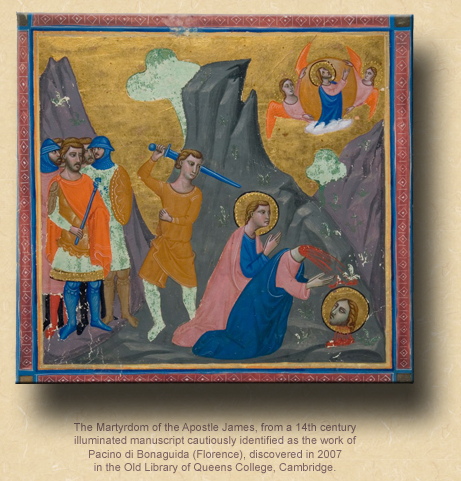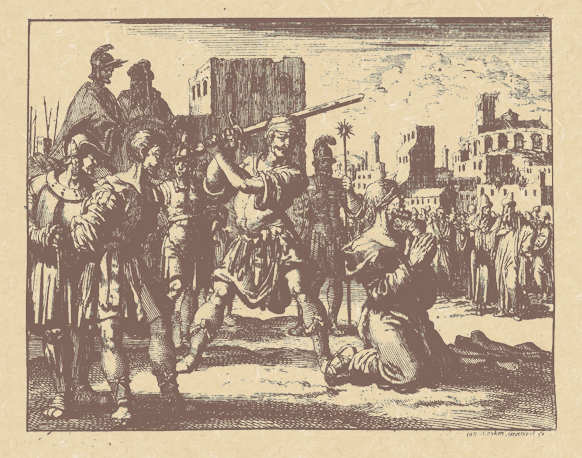Opening the Ulcer to Apply the Medicine.
The Feast of Saint James, Apostle.
Lessons from the proper, according to the ordinary form of the Roman Rite:
• II Corinthians 4: 7-15.
• Psalm 126: 1-6.
• Matthew 20: 20-28.
The Second Class Feast of Saint James, Apostle; and, the Commemoration of Saint Christopher, Martyr.*
Lessons from the proper, according to the extraordinary form of the Roman Rite:
• I Corinthians 4: 9-15.
• Psalm 44: 17-18.
• Matthew 20: 20-23.
|
Ordinarily, a Mass for the commemoration is not permitted on a second class feast; however, in the event the commemoration is promoted because the parish is named for the saint, the lessons would be as follows from the common "In Virtute…" of a Martyr not a Bishop:
• Wisdom 10: 10-14.
• Psalm 111: 1-2.
• Matthew 10: 34-42.
…otherwise, the commemoration is made by an additional Collect, Secret and Post-Communion added to the Mass of the current feast.
|
The Ninth Monday after Pentecost; the Feast of the Dormition of Saint Ann, Mother of the Theotokos; the Feast of the Holy Martyrs Olympiada & Euphraxia; and, the Feast of the Fathers of the Fifth Ecumenical Council.
First & third lessons from the pentecostarion, second & fourth from the menaion for Saint Ann, according to the Ruthenian recension of the Byzantine Rite:
• II Corinthians 2: 4-15.
• Galatians 4: 22-31.
• Matthew 23: 13-22.
• Luke 8: 16-21.
FatherVenditti.com
|
 7:21 AM 7/25/2016 — Let us begin by reviewing what we know about the Blessed Apostle James from the Holy Gospels: 7:21 AM 7/25/2016 — Let us begin by reviewing what we know about the Blessed Apostle James from the Holy Gospels:
James, son of Zebedee and brother of the Apostle John, was a Galilean. He and his brother were among the first Apostles to be called, and we are well familiar with the account of how they abruptly left their father and his nets to follow our Lord. James was one of three apostles who seemed to be special favorites of our Lord, as evidenced by the fact that he was among the three that Jesus permitted to witness His Transfiguration, and who were also blessed to be with our Lord when He prayed on the Mount of Olives. The lesson we drew from that, you may recall, was that the road to heaven is the Way of the Cross.
But there's a lot about this Apostle that we know from other sources, information not found in the Gospels: after our Lord's ascension into heaven, he preached the Divinity of Christ in Samaria, bringing many to the faith. After that, he went to Spain and made converts to Christ, including seven men who were later made bishops by Saint Peter and sent back to Spain, and it's from these seven men that Spain was received into the family of the Church; so, James is regarded as the spiritual father of Spain. After all this he returned to Jerusalem at the time that Herod had been made king by the emperor Claudius; and, to win favor with the Jews, Herod condemned James to be beheaded. When the man who brought him to the tribunal saw how courageously he went to his death, he at once professed himself a Christian also. As they both were being led to execution, this man begged the forgiveness of James, and it is said that, along the way, James stopped to heal a paralytic. The two men were beheaded together, making James the first of the Apostles to shed his blood for Christ.
The Gospel for his feast is a rather unflattering one, but is important nonetheless as it foreshadows the death James was to suffer for Christ. James' and John's mother tries to barter with our Lord for her sons to receive some sort of special treatment in the kingdom to come. She doesn't really know what she's asking, and our Lord points that out to her. But, that great Father of the Christian East of the fourth century, Saint John Chrysostom, has an interesting take on it: James, John and their mother aren't asking our Lord for anything spiritual; they're looking for some sort of honor.  They're not even sure what they want, as I said; they just know that our Lord's been talking about heavenly things, and they want some sort of promise of special treatment, and this is a spiritual fault. You see this very frequently when you're the pastor of a parish: you have this particular person who is very spiritual—which is good—but this causes him or her to give in to the temptation to think of himself as something special; so, he'll approach the priest and ask for some direction or counsel, and you'll say, “OK, just call the office and make an appointment.” And he doesn't like that, because he—or she—wants some kind of attention that's more than what any other parishioner would receive; so, the priest has to take him down a peg, and not treat him any differently than any other parishioner, otherwise he's just feeding into the sin of pride. It's a particularly affective weapon of the Devil: to take people in the first stages of spiritual awakening, and lead them to think that, because they are interested in spiritual perfection, they are better than everyone else and deserve more time from the parish priest than he gives to someone else. So, the priest has to slap him down for his own good. They're not even sure what they want, as I said; they just know that our Lord's been talking about heavenly things, and they want some sort of promise of special treatment, and this is a spiritual fault. You see this very frequently when you're the pastor of a parish: you have this particular person who is very spiritual—which is good—but this causes him or her to give in to the temptation to think of himself as something special; so, he'll approach the priest and ask for some direction or counsel, and you'll say, “OK, just call the office and make an appointment.” And he doesn't like that, because he—or she—wants some kind of attention that's more than what any other parishioner would receive; so, the priest has to take him down a peg, and not treat him any differently than any other parishioner, otherwise he's just feeding into the sin of pride. It's a particularly affective weapon of the Devil: to take people in the first stages of spiritual awakening, and lead them to think that, because they are interested in spiritual perfection, they are better than everyone else and deserve more time from the parish priest than he gives to someone else. So, the priest has to slap him down for his own good.
So, when our Lord says to the mother of James and John, “What do you want?” it's not because he doesn't know what's on their minds, but He needs to make a correction; so, as Saint John Chrysostom puts it:
“We want You to do for us,” they say, “whatever we ask.” To which Christ answers, “What do you want?” certainly not unknowing, but in order to force them to reply so that He might open the ulcer and apply the medicine to it.**
And here we see the real purpose of our Lord in castigating “Mom” the way he does. He needs to apply, as Chrysostom says, medicine to the ulcer which, in this case, is the sin of pride. Drinking from a cup belonging to another was a very common expression of friendship in our Lord’s time, so that’s probably what James and John thought our Lord was talking about. Chrysostom goes on to speculate that, after our Lord explains to them what they're really asking, which is the honor of drinking “the chalice that I am going to drink,”—in other words, His passion and death—they are filled with remorse over their mother's request; and, it's this that motivates James to go on and ultimately be the first of the Apostles to give his life for Christ. It dovetails with what we said on the feast of Saint Mary Magdalene about guilt being a great motivator to spur us on to do great things for our Lord.
So, James is a trailblazer: he's not only the first Apostle to be embarrassed by his mother; he's also the first to venture out of the Holy Land, taking the Holy Gospel and the Christian religion to Spain, which remained militantly devoted to the Catholic Faith for over a thousand years; and, he was the first Apostle to die a martyr's death. On his feast we should pray that the Lord apply the medicine of humility to the ulcer of our own pride, and not hesitate to whittle us down to size when that is what is for our spiritual good.

* Contrary to common opinion, Christopher was not removed from the Roman Calendar of the ordinary form because of doubts regarding his historicity, though the legend of him carrying the Child Jesus across a river are certainly spurious, and based on the fact that the name by which he is known—clearly not his real name—translates as “Christ-bearer.” Most likely, early artists portrayed this scene because of the meaning of the name, with the legend growing from there. In point of fact, this sub-Apostolic missionary, who was a "Christ-bearer" because he bore the Gospel of Christ to Asia Minor, suffered martyrdom at Lycia under Decius in AD 250.
** Homily on Matthew, as quoted in Lesson vii for Matins for the Feast of the Blessed Apostle James, Breviarium Romanum, 1960 edition.
|

